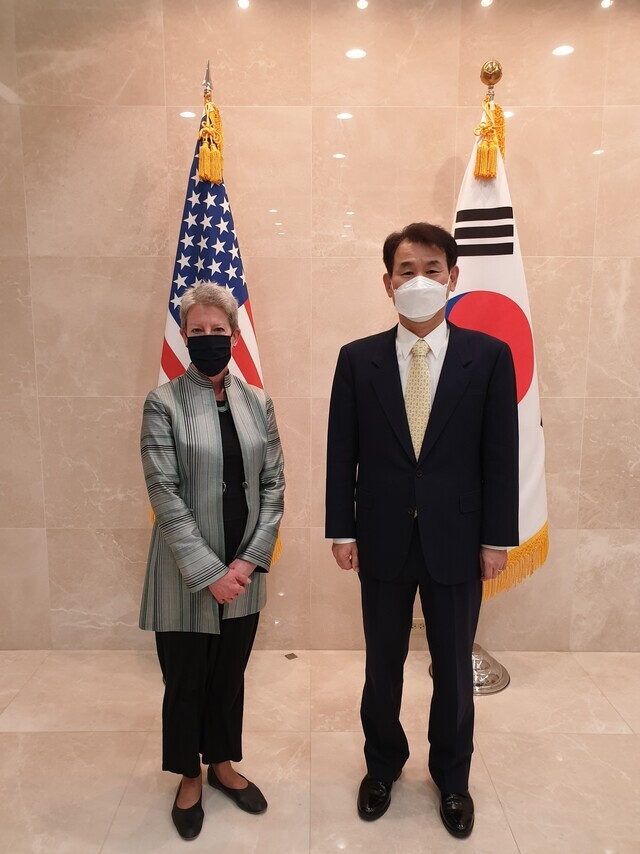hankyoreh
Links to other country sites 다른 나라 사이트 링크
[News analysis] New SMA reflects renewed US commitment to alliance

South Korea and the US concluded their negotiations on defense cost-sharing Sunday, removing a millstone that has weighed on the two sides’ relationship for nearly a year and a half.
It’s South Korea’s first real taste of the new era under US President Joe Biden, whose emphasis on restoring alliances contrasts with predecessor Donald Trump’s approach of treating alliances as transactional relationships.
The conclusion of the 11th Special Measures Agreement (SMA) negotiations between Seoul and Washington came just 46 days after Biden took office. After treading water during the latter half of Trump’s term, the negotiations proceeded swiftly once the new administration was in place.
Negotiations for the 11th SMA — which was supposed to go into effect in 2020 — began in September 2019. But early on in the process, Trump demanded an increase of US$5 billion in South Korea’s share of defense costs, a fivefold increase from the year before. The negotiations themselves became fraught with difficulties as a result.
In March 2020, the two sides reached a tentative agreement on a plan that would increase South Korea’s share of costs by 13 percent. But Trump continued to insist on a large hike, leaving the negotiations at an impasse that persisted until responsibility for resolving it passed over to the Biden administration with its inauguration last Jan. 20.
Since before the US presidential election in November 2020, many had predicted a rational resolution to the cost-sharing negotiations issue would emerge if Biden was elected.
In a special contribution to Yonhap News just before the election, then-candidate Biden wrote, “As President, I'll stand with South Korea, strengthening our alliance to safeguard peace in East Asia and beyond, rather than extorting Seoul with reckless threats to remove our troops [US Forces Korea].”
After Biden took office, the defense cost-sharing negotiations quickly gained momentum. The two sides had their eighth round of discussions via video on Feb. 5 before reaching a final agreement in a ninth-round held in person in Washington from Friday to Sunday. The result came after the latter round of discussions was extended to three days, from its originally scheduled two.
Commenting on the deal, the US State Department said, “This development reflects the Biden-Harris Administration’s commitment to reinvigorating and modernizing our democratic alliances around the world to advance our shared security and prosperity.”
The agreement comes just ahead of planned visits to Japan and South Korea by US Secretary of State Antony Blinken and Secretary of Defense Lloyd Austin. The two are expected to visit South Korea for two days after a visit to Japan on March 15-17.
The signing of a new SMA holds significance in laying the groundwork for normalizing and strengthening the South Korea-US and US-Japan alliances ahead of the two secretaries’ visit, after the damage done to them during the Trump administration.
On Feb. 17, the US and Japan agreed on a framework for 2021 US Forces Japan stationing costs in which Japan would pay a share of 201.7 billion yen (US$1.86 billion), an increase of 1.2 percent from the year before.
By Hwang Joon-bum, Washington correspondent
Please direct comments or questions to [english@hani.co.kr]

Editorial・opinion
![[Column] The state is back — but is it in business? [Column] The state is back — but is it in business?](https://flexible.img.hani.co.kr/flexible/normal/500/300/imgdb/original/2024/0506/8217149564092725.jpg) [Column] The state is back — but is it in business?
[Column] The state is back — but is it in business?![[Column] Life on our Trisolaris [Column] Life on our Trisolaris](https://flexible.img.hani.co.kr/flexible/normal/500/300/imgdb/original/2024/0505/4817148682278544.jpg) [Column] Life on our Trisolaris
[Column] Life on our Trisolaris- [Editorial] Penalties for airing allegations against Korea’s first lady endanger free press
- [Editorial] Yoon must halt procurement of SM-3 interceptor missiles
- [Guest essay] Maybe Korea’s rapid population decline is an opportunity, not a crisis
- [Column] Can Yoon steer diplomacy with Russia, China back on track?
- [Column] Season 2 of special prosecutor probe may be coming to Korea soon
- [Column] Park Geun-hye déjà vu in Yoon Suk-yeol
- [Editorial] New weight of N. Korea’s nuclear threats makes dialogue all the more urgent
- [Guest essay] The real reason Korea’s new right wants to dub Rhee a founding father
Most viewed articles
- 1[Column] Why Korea’s hard right is fated to lose
- 2Amid US-China clash, Korea must remember its failures in the 19th century, advises scholar
- 3[Column] The state is back — but is it in business?
- 4[Column] Can Yoon steer diplomacy with Russia, China back on track?
- 560% of young Koreans see no need to have kids after marriage
- 6[Guest essay] Maybe Korea’s rapid population decline is an opportunity, not a crisis
- 7South Korea officially an aged society just 17 years after becoming aging society
- 8Trump’s talk of flouting NATO promises sparks apprehension in Seoul
- 9[Editorial] Penalties for airing allegations against Korea’s first lady endanger free press
- 10[Column] Life on our Trisolaris